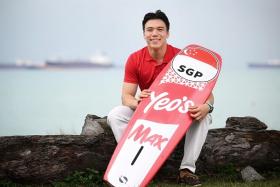Tay the water polo goalkeeper and doctor
Tay sees many parallels between being a water polo goalkeeper and a doctor
His eyes are always fixed on the ball.
As his opponent cocks and shoots, Nigel Tay anticipates the moment, generates a great deal of force, before lunging across goal to make a flying save.
Tay is the goalkeeper of the national men's water polo team, and his goal he protects measures 3m wide and 90cm high. Piece of cake, you say?
Now try staying afloat in the pool as you try to keep out shots that can reach 90kmh.
Or treading water - water polo players employ the egg-beater, where they alternate legs while frog-kicking - for 32 minutes.
Or tussling with another player trying to drag and climb over you as if he is trying to drown you.
On top of all that, the players have to stay alert, shutting out all the whistles and trash-talking, and try to launch counter-attacks.
Water polo was originally known as water rugby, and it is not difficult to see that it's effectively a combination of sprinting, basketball, ice hockey (in terms of the constant fouling), wrestling and rugby, all these in a pool that can measure up to 30m by 20m.
"Goalkeepers are all a little crazy, but more so for water polo goalkeepers," said Tay. "Our job is different from goalkeepers from other sports because we also have to deal with the water.
"So we need to do a lot of leg training, quick bursts and intense jumps because our game is basically that.
"The difficulty comes in how we sustain our jumps and our timing because we need to hang as high and long as we can to reach the extreme corners.
"There's also a lot of tactical fouling and grappling that go on under water. But what the referee doesn't see, he cannot award a foul. We just have to suck it up and stay focused."
Tay practises what he preaches - the 27-year-old actually tore his right adductor muscle in the third quarter of a crucial match against closest competitors Indonesia at the last South-east Asia (SEA) Games.
But he held on for the final quarter, where he made two point-blank saves to help his team win 8-5 en route to winning Singapore's 25th consecutive men's water polo gold.
There is no doubt Tay is a high-flier, but we are not just talking about how he overcomes water resistance to propel himself to make a vital save.
Outside of the pool, he is a doctor, and currently serves as a medical officer with the Singapore Armed Forces.
It is not an easy balancing act, as he said: "It is physically and mentally exhausting to juggle work and training because we have evening training every day.
"For me, it's about give and take. As a doctor, I have to make night calls and I'm thankful my coaches and team-mates are understanding when I have to miss training, but I do make-up training on my own."
As a goalkeeper, Tay is able to draw some parallels with his day job.
"Goalkeepers are very analytical, very much like doctors," he said.
"We learn about geometry because in water polo we rarely face curling shots. Most are in straight lines so we have to judge our angles and how to cover as much area as possible. We also assess our opponents and look at things from a macro perspective - their strengths, how they line up, how they take their shots.
"We look at the opponents' goalkeepers and try to see what their weaknesses are, if they are weak at handling bouncing shots for example, so we can tell our teammates what shots to go for.
"We pick these up as subtlely as doctors do to understand a patient's condition.
"But, most of all, it is passion that keeps me in both jobs."
Banker Yew wants to go out on a high by helping women's team to gold

Adelyn Yew - PHOTO: JONATHAN CHOO
As a centre forward, she loves the thrill of seeing her shots hit the back of the net.
For Adelyn Yew, that feeling took on a different significance in 2011, when women's water polo was finally added to the SEA Games programme for the first time.
The 30-year-old told The New Paper: "It feels like we have come a long way since I first joined the national team after my A levels in 2003.
"Back then, we didn't get to compete in many competitions and we played in mostly invitational events in the region.
"Over the years, we persevered and trained in the hope of being able to play at the SEA Games and have a legacy like the men's team.
"We are very happy that everything has mostly fallen into place, although we were disappointed that the event wasn't included in the 2013 SEA Games."
Many doors have also opened since they won the gold medal at the 2011 Games, where Yew was the top scorer in the final with a hat-trick in the 11-9 win over hosts Indonesia.
Last year, they played at the Asian Games where they finished fifth, and also in the Fina Women's Water Polo World Cup where they came in eighth.
The exposure was miles apart from a decade ago, where they had trouble finding credible opponents and could only spar among teammates.
With a SEA Games gold under her belt, progress made in her sport, and this year's competition being held on home soil, Yew feels that it symbolises a coming of full circle.
But she has unfinished business. Reavealing that she is likely to retire from the national team after the Games to climb the corporate ladder, Yew wants to go out on a high.
"I'm a banker, a relationship manager with OCBC and I have a client-facing, sales-driven job," said the Singapore Swimming Association's women's water polo Player of the Year.
"I'm thankful I have bosses and colleagues who have been really understanding.
"Other than that, it's really down to discipline and time management to be able to juggle work and sport.
"Looking back, I started water polo because I was bored with competitive swimming and I was intrigued by its fast pace. I never knew it can be so challenging, fun and exciting, or that I would be in the national team for so long.
"It would really be a nice end to my time with the national team if we can defend our title in front of our fellow Singaporeans."
Victory will not come easy with Indonesia, Thailand, Malaysia and the Philippines aiming to upset the hosts.
But Yew remains upbeat, and said: "We have been training hard. We went to China last month and played high-quality friendlies against the provincial sides who had national players in their teams.
"I feel we will have the edge at the SEA Games because we have depth in all the positions. We also have a good blend of experienced and young players.
"It's hard not to be associated with the men's winning streak. Winning in 2011 adds to the expectations, but it's up to us to cope with it.
"We have played in the SEA Championships at home, so playing in front of a home crowd will not be something new.
"There's pressure on us to retain our title, but that's definitely our target."
Days to go: 34

34
This is a special year for East Coast Primary School.
As it celebrates its 34th anniversary, it is proud to be part of the countdown to the 28th SEA Games which also coincides with SG50.
A total of 750 students from East Coast Primary participated in the formation of the number 34 with the recycled materials that they collected.
"Recycling is a programme in our school and therefore to see that the materials are being used for the art installation for the countdown formation is something meaningful and a learning journey for our students," said East Coast Primary's teacher-in-charge Mdm Muryani.

34
The men's basketball team ended a 34-year SEA Games medal drought when they won bronze in Myanmar two years ago behind the Philippines and Thailand. Led by coach Neo Beng Siang, they are aiming for an unprecedented gold.
'Every SEA Games is unique'
Nigel Tay is set to compete in his fifth SEA Games next month, and each of them has been a unique experience.
"The 2007 SEA Games in Korat was my first, and it was the fear of the unknown. The team went through a reorganisation and many young players like me were thrown into the deep end. It was a thrilling experience and we stepped up to deliver," he said. "The 2009 edition in Vientiane was a culture shock because when we stepped off the plane, it looked like a piece of desert, although we felt like VIPs because we had so many guards following us.
"The 2011 one in Palembang was scary because the hotel we stayed in was haunted. A few teammates and I found long strands of hair in our gear.
"Some of them experienced their hair being tugged while they were sleeping, and others felt like they were being watched while they were showering.
"Myanmar 2013 was memorable because I tore my right adductor muscle in the third quarter of the final match but continued playing. After the match, I was in such excruciating pain that I went into shock and hyperventilated.
"This year, it's going to be completely different because we will have family and friends who have never watched us compete at the SEA Games.
"This gives us extra motivation to make it 26 golds in a row."
Get The New Paper on your phone with the free TNP app. Download from the Apple App Store or Google Play Store now



